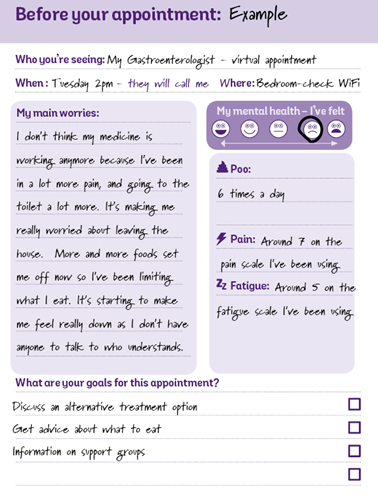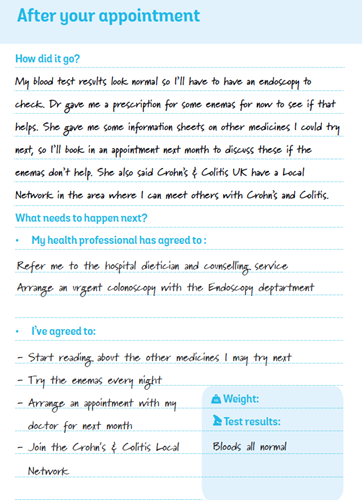Lots of things have been changing in our lives due to coronavirus, and how you see your doctor or nurse may be one of them. IBD services have worked quickly to adapt how they provide care, and many are now able to offer you telephone and video consultations and clinics. There are lots of benefits to this new service, but you may also have some questions and concerns if you haven't had a virtual appointment before.
Top tips for getting the most out of your virtual (telephone or video) appointment

Virtual appointments can have advantages:
- Reducing the possible risks of exposure to coronavirus
- Reducing stress, time, and expense of travel and parking - this can really help if your symptoms make it difficult to leave your home
- Fitting around family and work life
- More direct sources of information and support such as links to website resources.
But a virtual appointment may not be appropriate for all situations, and there may be times when a face-to-face appointment is what you prefer. This should be a decision between you and your IBD team. You should feel comfortable to ask for a face-to-face appointment if this is your preference. In our recent Life in Lockdown Survey, 1 in 2 people said that in the post-coronavirus future they'd like to have the choice between face-to-face and virtual appointments.
So, here are our Top Tips to help you get the most out of your virtual appointment:
Before your appointment
- Think about what matters to you and what you want to get out of the appointment.
- Make a note of all symptoms, however mild, that you've had since your last appointment so you can refer to them during the consultation.
- Write down any questions you have. You can download pages like the one below to use during your appointment in My Appointments Journal.
Preparing for the call
All calls will be safe and secure. You'll get an email or letter to tell you the time of the appointment and how the call will work. Do ask if you have any queries about this.
- If you have any communication needs or would like a family member or friend present, let your health professionals know what support will make the virtual appointment work for you.
- Make sure the health professional has the correct number to contact you on. Calls from health professionals may be seen on your phone as "No Caller ID" or number withheld.
- Find a quiet, comfortable place where you won't be disturbed during your appointment.
- Ensure you've got a good phone signal or internet connection.
- If it's a video consultation, have good lighting so your health professional can see how you look - especially if you're feeling unwell.
- You can ask to record the call or make thorough notes, so you can look back at what's been said.
During your appointment
Treat your virtual appointment as you would a face-to-face consultation, and you should have the same amount of time.
- Your health professional should introduce themselves clearly and confirm that they're talking to the right person. This is likely to be your name, your date of birth and the first line of your address.
- If this is new to you, just look at your health professional on the screen - you don't need to look into the camera. Relax and take your time.
- Be honest about how your condition is affecting you and how you've been getting on in lockdown - especially if you're struggling with your mental health.
- Don't be afraid to ask questions and ask for clarification if you're unsure of any of the answers. Try phrases like "can you help me understand" or "so you mean…?"
- Ask your health professional to repeat themselves if you miss something.
- Your consultation should finish with a summary from your health professional of the key points, a plan for further action and a follow up appointment, if you need one. Find out if this will be face-to-face, over the phone or by video.
After your appointment
- How did it go? - It's helpful to keep a note of what was said. You can download pages like the one below to use during your appointment in My Appointments Journal.
- What happens next?
- What is your health professional going to do?
- What are your next steps?
- Put the next appointment in your diary
- Update your journal
- Look up anything you're unsure about
I have had one telephone appointment and it was a really good experience. It was not a consultant I know but it was thorough and there was plenty of opportunity for me to input and ask questions. The one issue was the need for me to have my bloods monitored which would normally happen in clinic. However, this has been arranged to take place at my GP surgery instead which is great.
My care is 20 miles away in a city centre so it can take up a lot of time travelling in heavy traffic and struggling to park. I would only want to receive a telephone or video appointment if my condition is stable, there would need to be an option for a face to face consultation if I had concerns or was deteriorating - or at least opportunity for a swift follow up post telephone/video appointment.
Find out more about how to get the most out of all your appointments with My Appointments Journal. This will help you to get the most out of your time with health professionals, to take note of how you're feeling in between appointments and focus on what matters to you.
Have an upcoming appointment?
Take a look at our new Appointments Guide
Helpline Service
We know it can be difficult to live with, or support someone living with these conditions. But you’re not alone. We provide up-to-date, evidence-based information and can support you to live well with Crohn’s or Colitis.
Our helpline team can help by:
-
Providing information about Crohn’s and Colitis.
-
Listening and talking through your situation.
-
Helping you to find support from others in the Crohn’s and Colitis community.
-
Providing details of other specialist organisations.
Please be aware we’re not medically or legally trained. We cannot provide detailed financial or benefits advice or specialist emotional support.
Please contact us via telephone, email or LiveChat - 9am to 5pm, Monday to Friday (except English bank holidays).
If you need specific medical advice about your condition, your GP or IBD team will be best placed to help.


